Unit 4 Don’t eat in class.全单元学案
文档属性
| 名称 | Unit 4 Don’t eat in class.全单元学案 |
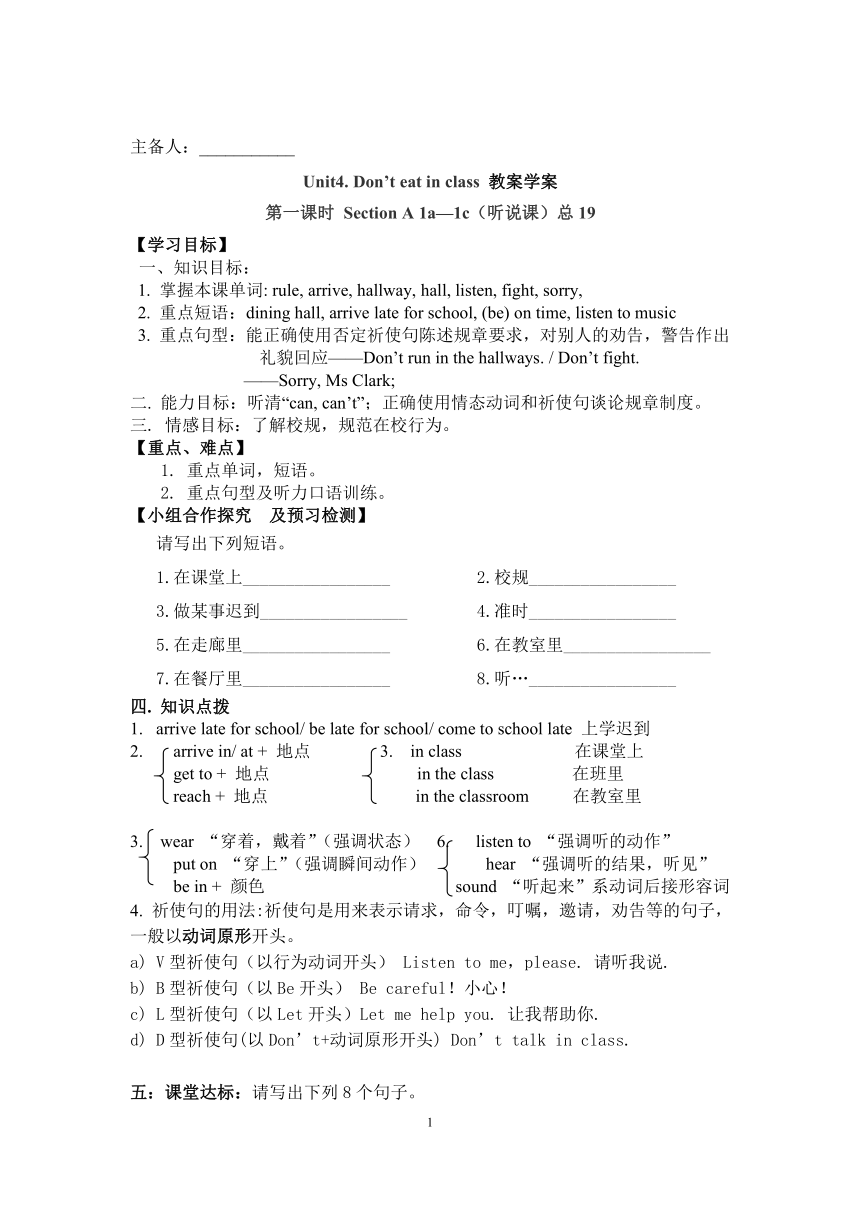
|
|
| 格式 | zip | ||
| 文件大小 | 30.4KB | ||
| 资源类型 | 教案 | ||
| 版本资源 | 人教新目标(Go for it)版 | ||
| 科目 | 英语 | ||
| 更新时间 | 2013-03-18 17:09:04 | ||
图片预览

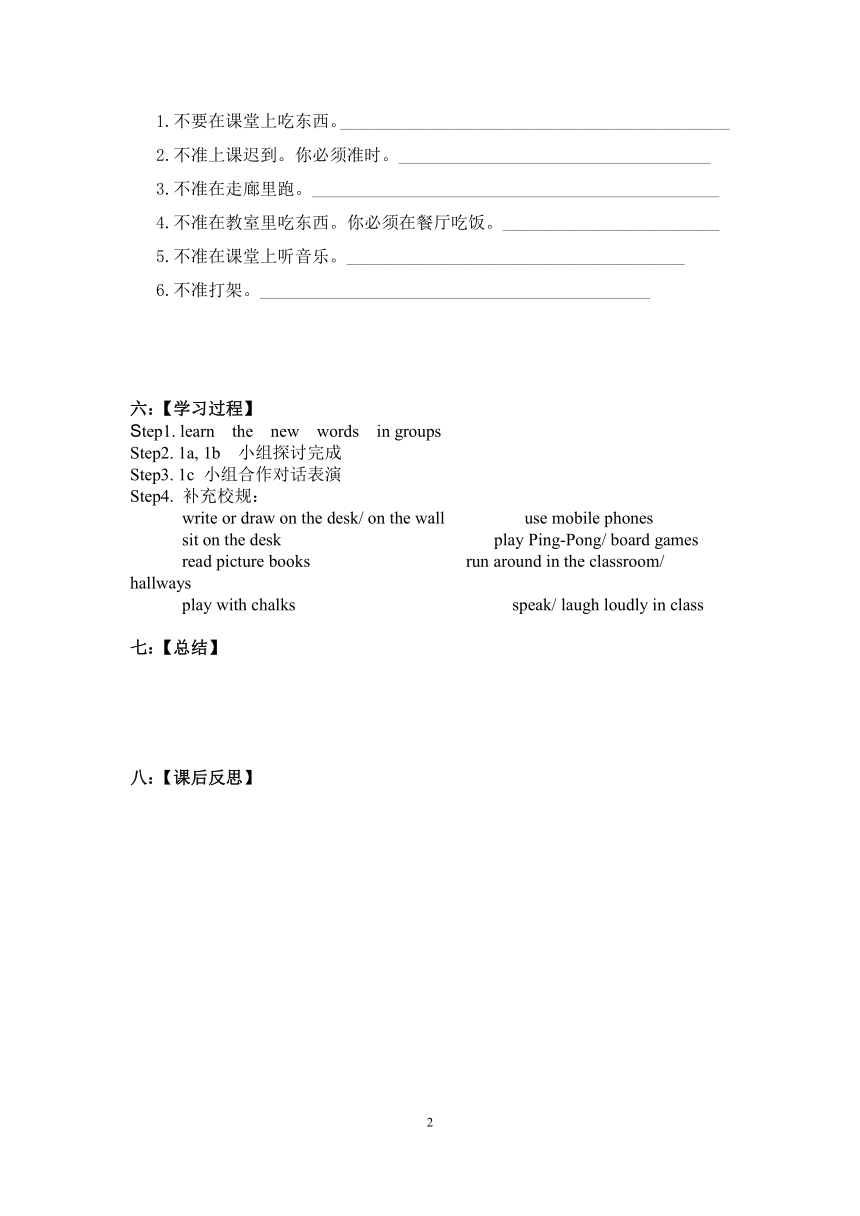
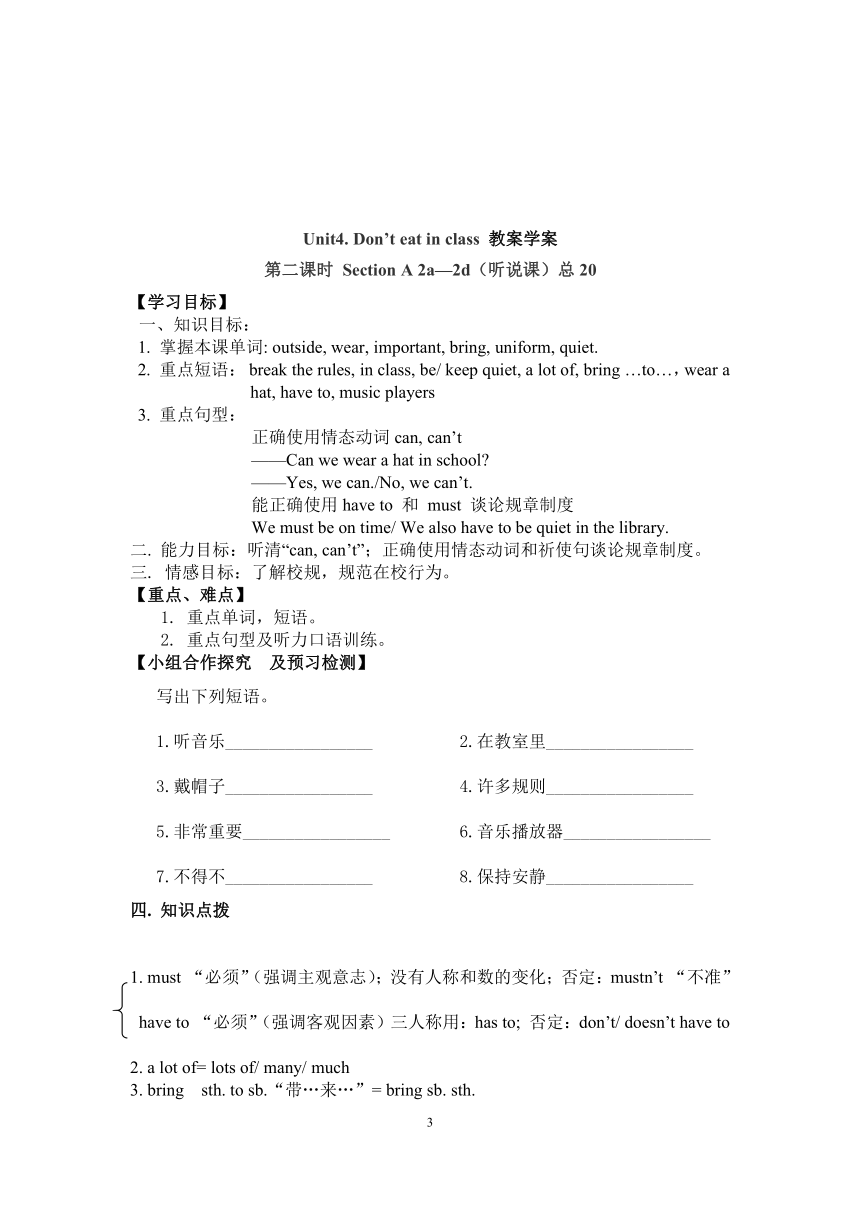
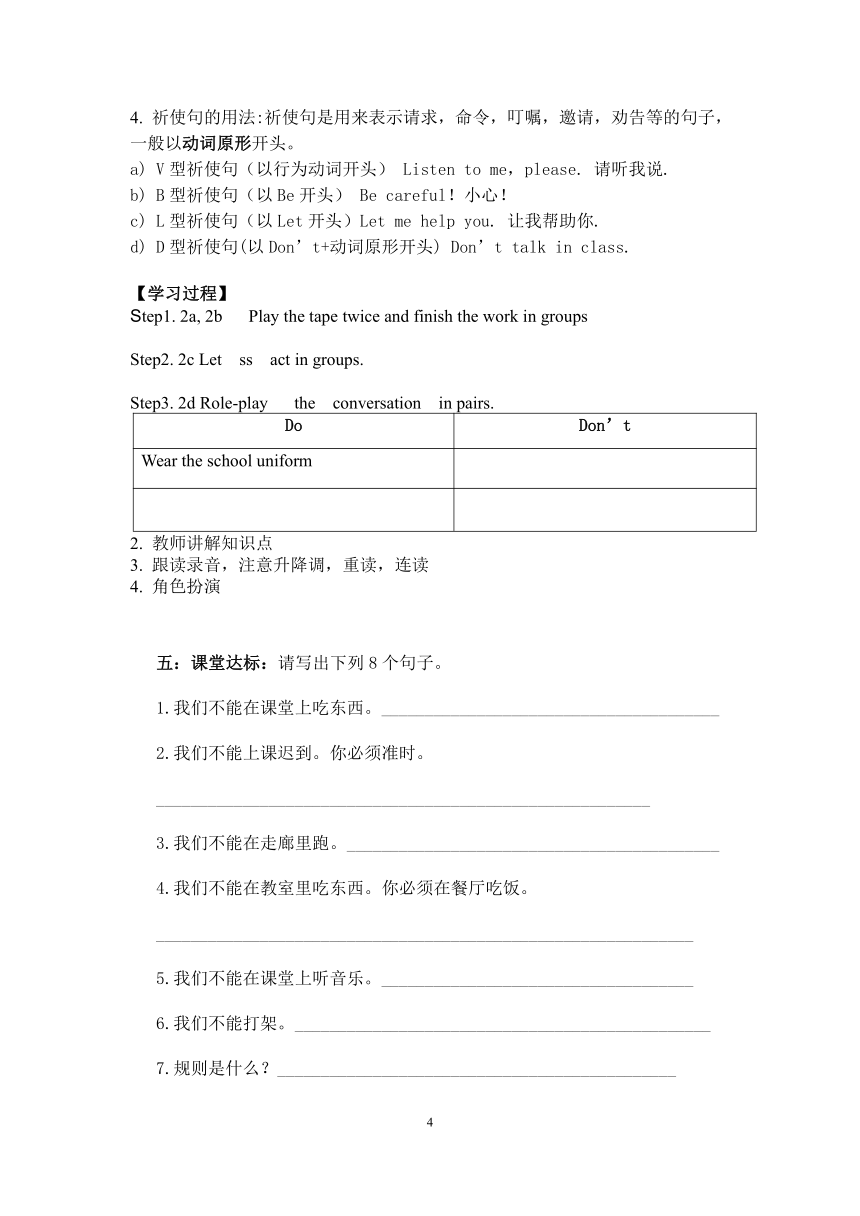
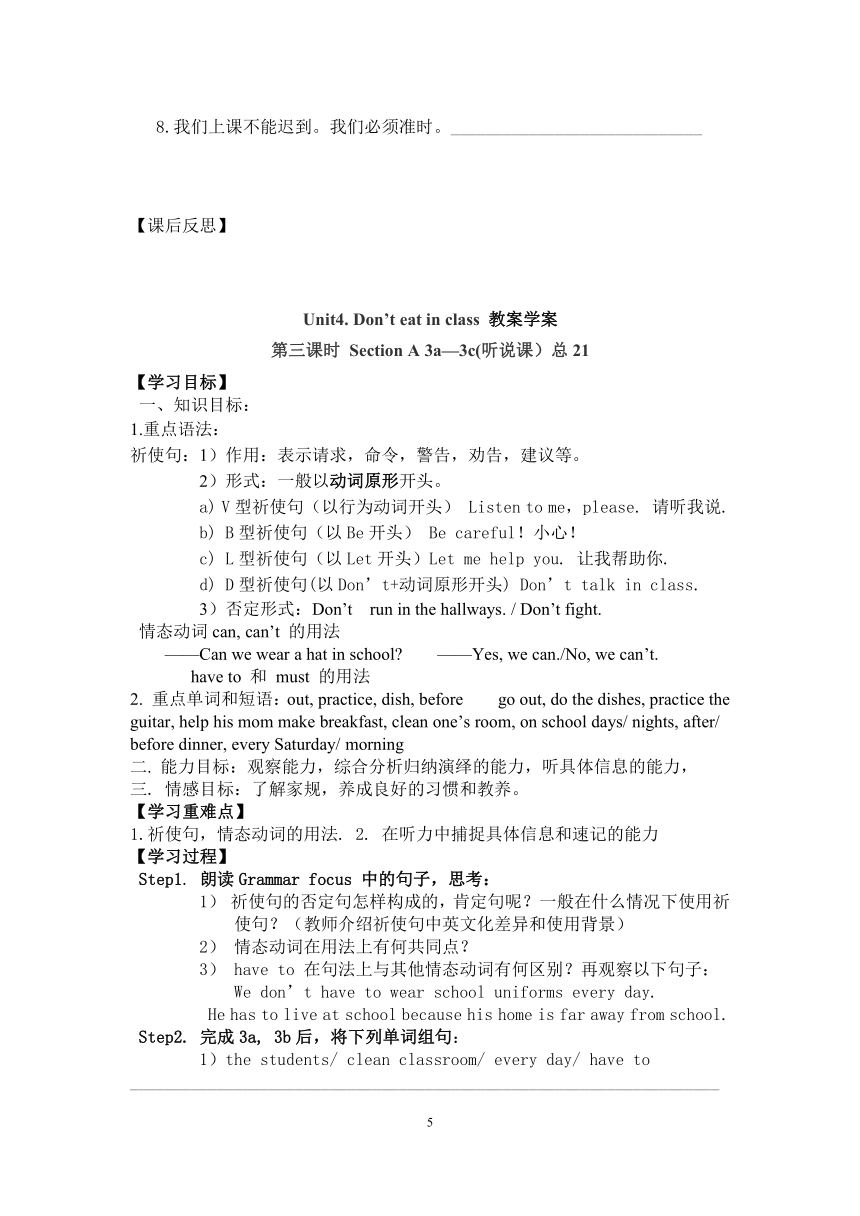
文档简介
主备人:___________
Unit4. Don’t eat in class 教案学案
第一课时 Section A 1a—1c(听说课)总19
【学习目标】
一、知识目标:
1. 掌握本课单词: rule, arrive, hallway, hall, listen, fight, sorry,
2. 重点短语:dining hall, arrive late for school, (be) on time, listen to music
3. 重点句型:能正确使用否定祈使句陈述规章要求,对别人的劝告,警告作出礼貌回应——Don’t run in the hallways. / Don’t fight.
——Sorry, Ms Clark;
二. 能力目标:听清“can, can’t”;正确使用情态动词和祈使句谈论规章制度。
三. 情感目标:了解校规,规范在校行为。
【重点、难点】
1. 重点单词,短语。
2. 重点句型及听力口语训练。
【小组合作探究 及预习检测】
请写出下列短语。
1.在课堂上_________________ 2.校规_________________
3.做某事迟到_________________ 4.准时_________________
5.在走廊里_________________ 6.在教室里_________________
7.在餐厅里_________________ 8.听…_________________
四. 知识点拨
arrive late for school/ be late for school/ come to school late 上学迟到
arrive in/ at + 地点 3. in class 在课堂上
get to + 地点 in the class 在班里
reach + 地点 in the classroom 在教室里
3. wear “穿着,戴着”(强调状态) 6. listen to “强调听的动作”
put on “穿上”(强调瞬间动作) hear “强调听的结果,听见”
be in + 颜色 sound “听起来”系动词后接形容词
4. 祈使句的用法:祈使句是用来表示请求,命令,叮嘱,邀请,劝告等的句子,一般以动词原形开头。
a) V型祈使句(以行为动词开头) Listen to me,please. 请听我说.
b) B型祈使句(以Be开头) Be careful!小心!
c) L型祈使句(以Let开头)Let me help you. 让我帮助你.
d) D型祈使句(以Don’t+动词原形开头) Don’t talk in class.
五:课堂达标:请写出下列8个句子。
1.不要在课堂上吃东西。_____________________________________________
2.不准上课迟到。你必须准时。____________________________________
3.不准在走廊里跑。_______________________________________________
4.不准在教室里吃东西。你必须在餐厅吃饭。_________________________
5.不准在课堂上听音乐。_______________________________________
6.不准打架。_____________________________________________
六:【学习过程】
Step1. learn the new words in groups
Step2. 1a, 1b 小组探讨完成
Step3. 1c 小组合作对话表演
Step4. 补充校规:
write or draw on the desk/ on the wall use mobile phones
sit on the desk play Ping-Pong/ board games
read picture books run around in the classroom/ hallways
play with chalks speak/ laugh loudly in class
七:【总结】
八:【课后反思】
Unit4. Don’t eat in class 教案学案
第二课时 Section A 2a—2d(听说课)总20
【学习目标】
一、知识目标:
1. 掌握本课单词: outside, wear, important, bring, uniform, quiet.
2. 重点短语: break the rules, in class, be/ keep quiet, a lot of, bring …to…,wear a hat, have to, music players
3. 重点句型:
正确使用情态动词can, can’t
——Can we wear a hat in school?
——Yes, we can./No, we can’t.
能正确使用have to 和 must 谈论规章制度
We must be on time/ We also have to be quiet in the library.
二. 能力目标:听清“can, can’t”;正确使用情态动词和祈使句谈论规章制度。
三. 情感目标:了解校规,规范在校行为。
【重点、难点】
1. 重点单词,短语。
2. 重点句型及听力口语训练。
【小组合作探究 及预习检测】
写出下列短语。
1.听音乐_________________ 2.在教室里_________________
3.戴帽子_________________ 4.许多规则_________________
5.非常重要_________________ 6.音乐播放器_________________
7.不得不_________________ 8.保持安静_________________
四. 知识点拨
1. must “必须”(强调主观意志);没有人称和数的变化;否定:mustn’t “不准”
have to “必须”(强调客观因素)三人称用:has to; 否定:don’t/ doesn’t have to
2. a lot of= lots of/ many/ much
3. bring sth. to sb.“带…来…”= bring sb. sth.
4. 祈使句的用法:祈使句是用来表示请求,命令,叮嘱,邀请,劝告等的句子,一般以动词原形开头。
a) V型祈使句(以行为动词开头) Listen to me,please. 请听我说.
b) B型祈使句(以Be开头) Be careful!小心!
c) L型祈使句(以Let开头)Let me help you. 让我帮助你.
d) D型祈使句(以Don’t+动词原形开头) Don’t talk in class.
【学习过程】
Step1. 2a, 2b Play the tape twice and finish the work in groups
Step2. 2c Let ss act in groups.
Step3. 2d Role-play the conversation in pairs.
Do
Don’t
Wear the school uniform
2. 教师讲解知识点
3. 跟读录音,注意升降调,重读,连读
4. 角色扮演
五:课堂达标:请写出下列8个句子。
1.我们不能在课堂上吃东西。_______________________________________
2.我们不能上课迟到。你必须准时。
_________________________________________________________
3.我们不能在走廊里跑。___________________________________________
4.我们不能在教室里吃东西。你必须在餐厅吃饭。
______________________________________________________________
5.我们不能在课堂上听音乐。____________________________________
6.我们不能打架。________________________________________________
7.规则是什么?______________________________________________
8.我们上课不能迟到。我们必须准时。_____________________________
【课后反思】
Unit4. Don’t eat in class 教案学案
第三课时 Section A 3a—3c(听说课)总21
【学习目标】
一、知识目标:
1.重点语法:
祈使句:1)作用:表示请求,命令,警告,劝告,建议等。
2)形式:一般以动词原形开头。
a) V型祈使句(以行为动词开头) Listen to me,please. 请听我说.
b) B型祈使句(以Be开头) Be careful!小心!
c) L型祈使句(以Let开头)Let me help you. 让我帮助你.
d) D型祈使句(以Don’t+动词原形开头) Don’t talk in class.
3)否定形式:Don’t run in the hallways. / Don’t fight.
情态动词can, can’t 的用法
——Can we wear a hat in school? ——Yes, we can./No, we can’t.
have to 和 must 的用法
2. 重点单词和短语:out, practice, dish, before go out, do the dishes, practice the guitar, help his mom make breakfast, clean one’s room, on school days/ nights, after/ before dinner, every Saturday/ morning
二. 能力目标:观察能力,综合分析归纳演绎的能力,听具体信息的能力,
三. 情感目标:了解家规,养成良好的习惯和教养。
【学习重难点】
1.祈使句,情态动词的用法. 2. 在听力中捕捉具体信息和速记的能力
【学习过程】
Step1. 朗读Grammar focus 中的句子,思考:
1) 祈使句的否定句怎样构成的,肯定句呢?一般在什么情况下使用祈使句?(教师介绍祈使句中英文化差异和使用背景)
2) 情态动词在用法上有何共同点?
3) have to 在句法上与其他情态动词有何区别?再观察以下句子:
We don’t have to wear school uniforms every day.
He has to live at school because his home is far away from school.
Step2. 完成3a, 3b后,将下列单词组句:
1)the students/ clean classroom/ every day/ have to
____________________________________________________________________
2) she/ not/ have to/ be at home/ at five o’clock
_____________________________________________________________________
3) she/ have to/ do morning reading/ every day
____________________________________________________________________
Step 3句型再现 请写出下列6个句子。
1.我不能在上学日的晚上出去。
_________________________________________________________
2.我不能在学校上课日见我的朋友们。
______________________________________________________
3.我必须在放学后做作业。
________________________________________________________
4.我必须在晚饭前练习吉他并且然后我必须饭后清洗餐具。
____________________________________________________________________
5.我必须每天早上帮我妈妈做早饭。
___________________________________________________________
6.我必须每周六打扫我的房间。
___________________________________________________________
Step 4 知识点拨
practice的用法
practice 后接名词,代词或 V-ing形式。
He practices (play)the piano every day.
【课后巩固】
一、完成下列句子
1.We can’t listen to music in the classroom.(改为祈使句)
to music in the classroom.
2.Eat in class ,please.(改为否定句) _________ in class,please.
3.They have to clean the classroom every day.(对划线部分提问)
They have to _________every day.
4.Listen to music in the hallways(改否定句)
Listen to music in the hallways.
5. She has to wash clothes every week. (改为一般疑问句)
Does she wash her clothes every day.
【课后反思】
Unit4. Don’t eat in class 教案学案
第四课时Section B 1a—1d 总22
【学习目标】
一、知识目标:
1.重点语法:
祈使句:1)作用:表示请求,命令,警告,劝告,建议等。
2)形式:一般以动词原形开头。
a) V型祈使句(以行为动词开头) Listen to me,please. 请听我说.
b) B型祈使句(以Be开头) Be careful!小心!
c) L型祈使句(以Let开头)Let me help you. 让我帮助你.
d) D型祈使句(以Don’t+动词原形开头) Don’t talk in class.
3)否定形式:Don’t run in the hallways. / Don’t fight.
情态动词can, can’t 的用法
——Can we wear a hat in school? ——Yes, we can./No, we can’t.
have to 和 must 的用法
2. 重点单词和短语:out, practice, dish, before go out, do the dishes, practice the guitar, help his mom make breakfast, clean one’s room, on school days/ nights, after/ before dinner, every Saturday/ morning
二. 能力目标:观察能力,综合分析归纳演绎的能力,听具体信息的能力,
三. 情感目标:了解家规,养成良好的习惯和教养。
【学习重难点】
1.祈使句,情态动词的用法. 2. 在听力中捕捉具体信息和速记的能力
Step 1.【小组合作探究 及预习检测】
写出下列词组:
1.看朋友__________________ 2. 练习弹吉他 __________________
3.帮助妈妈做早餐 ______________ 4. 洗碗 _________________
5.在上学的晚上______________ 6 .在上学的时间 __________________
Step2.1a Let ss read the rules in the chart in 1b.Then match the pictures with the rules. check the answers. Work in groups.
Step3. Play the tape twice ,let ss finish off 1b and 1c in groups. check the answers.
Step4.let ss talk about the rules in Dave’s house in pairs. And let ss act their own conversations in pairs.
Step5. 课堂达标
翻译句子
我有太多规则。
我不得不放学后做我的家庭作业。
我不得不帮助妈妈做早餐。
在上学的晚上我不能外出。
在学习日我不能看望我的朋友。
Step6.知识点拨
一、must的用法
①表示主观的义务和必要,主要用于肯定句和疑问句,意思为“必须……,得……,要……”;由must引起的疑问句,肯定回答要用must或have to,否定回答要用needn’t或don’t have to,意思是“不必”;must的否定形式 mustn’ t表示禁止,意思是“不能,不许”。如:
①must表示一种主观的需要,而have to 表示一种客观的需要,意思是“不得不”。 如:
Mother is out,so I have to look after the shop.
妈妈不在家,因此我不得不照看商店。
②have to 的否定形式是don’t have to,相当于needn’t.如:
They don’t have to buy a computer at present.
他们目前没有必要买电脑。
—Must I finish the task right now?
我现在必须完成这个工作吗?
—Yes,you must. / Yes,you have to.
(—No,you needn’t. / No,you don’t have to.)
You mustn’t come here without permission. 未经允许,你不能来这儿。
②表示肯定的猜测,常用于肯定句中,意思为 “一定是, 必然……”。注意must表示推断或猜测的几种情况。如:
Your sister must be a doctor in this hospital.
【课后反思】
Unit4. Don’t eat in class 教案学案
第五课时 Section B 2a—2c(阅读课)总23
【学习目标】
一、知识目标:
1. 掌握本课单词: dirty, kitchen, more, noisy, relax, read, terrible, feel, strict, remember, follow, luck
2. 重点短语:make one’s bed, be strict (with sb.), follow the rules, too many rules, read a book, good luck,
3. 重点句子:1) There are too many rules!
2) Get up new and make your bed
3) Don’t leave the dirty dishes in the kitchen.
4) I must read a book before I can watch TV.
5) I know how you feel.
6) You can watch TV after you read a book.
二. 能力目标:1.根据问题快速浏览信息的能力2. 提取有效信息的能力。
三. 情感目标:
1. 试着站在家长,老师的角度看待家规,懂得“规则”的必要性
2. 在遇到压力和烦恼时可以寻找心理医生等健康途径疏导,解决。
【学习重难点】
1.重点词汇:relax, strict, feel, remember, follow
2. 重点短语:make one’s bed, be strict (with sb.), follow the rules, too many rules, read a book, 3. 重点语法知识点。
4. 浏览,跳读,信息归纳的阅读技能。
【学习过程】
Pre-reading
Step 1,预习检测
1.铺床_________________ 2.对某人要求严格_________________
3.遵守规则_________________ 4.太多的规则_________________
5.在厨房里_________________ 6.更多的规则_________________
Step2. Warming-up
1. Write the rules in your home_____________________________________
2. What do you think of those rules, are they fair or unfair?
While -Reading
Step 1.仔细默读第一封信,将Molly 的家规划线。
Step 2.用情态动词can , can’t; must, have to将圈出的家规转写到表格中.
Molly’s family rules
Fair(√)or unfair(×)
1. She has to get up at six o’clock every morning
3. She can’t leave dirty dishes in the kitchen
Step3 完成2c
Step4 教师讲解知识点后,学生跟录音齐读,注意语音语调,重读,连读, 弱读。
Step5. 阅读第二封信,找出Dr. Know 的观点并划线。
Step6. 讲解知识点,总结开头句:________________________结尾句:_________________
After-reading
Step1. 根据开头句,结尾句,表格复述第一封信。
【课后反思】
Unit 4 Don’t eat in class. 教案学案
第六课时 Section B 3a—3c(语法写作课)总24
【学习目标】
一、知识目标:
1. 复习本单元重点词汇,短语。
2. 复习本单元重点语法,知识点。
3. 写一封信向Dr. Know 进行心理求助。
二. 能力目标:1.整理笔记,使知识,结构化条理化。
2.培养归纳演绎能力和发散思维训练。
3.了解西方心理求助背景,使用祈使句和情态动词写一封规范的心理求助信。
三. 情感目标:
1. 试着站在家长,老师的角度看待家规,懂得“规则”的必要性
2. 在遇到压力和烦恼时可以寻找心理医生等健康途径疏导,解决。
【学习重难点】
一、 重点词汇:arrive, wear, bring, practice, relax, strict, feel, remember, follow
二、 重点短语:dining hall, arrive late for school, (be) on time, listen to music, go out, follow/break the rules, in class, be/ keep quiet, a lot of, bring …to…,wear a hat, have to, music players make one’s bed, be strict (with sb.), follow the rules, too many rules, read a book,
三、重点语法知识点。
1. fight for“为…而斗争”,后面常接抽象名词,表示为事业、自由等而斗争。fight against“为反对…而战斗”, fight with“和…打架”,“同…(并肩)战斗”
They fought ________the Italians in the last war, but__ _____them in this war.
A. with; with B. with; for C. against ; against D. with; against
2.Ms./Mrs./Miss.
Ms.:“女士”,用于婚姻状况不明或不想区分婚否的女子的姓前。Mrs.:“夫人”,用于已婚女子姓前。Madam:也用于已婚女子,意为“夫人、女士”,一般单独使用,不与姓连用
Miss.:“小姐”用于未婚女子姓前,还常用于年轻的女教师的姓前,可译为“老师”。
3. 辨析: get to/reach/arrive
get to+地点;reach+地点arrive at+小地点(车站等);arrive in+大地点(国家等)
---What time did the team _______the top of the mountain?
---At about 4:30 p.m.
A. come B. go C. arrive D. arrive at
4. on time“准时,按时”,指按规定的时刻不早不晚。in time“及时”,指没有迟到
5. hear、listen和sound都有"听"的意思,但三者是有区别的:hear"听说"?侧重于"听"的内容。listen"听"侧重于"听"这一动作. sound"听起来"?它是系动词?后面接形容词等。
________ carefully, or you are not able to________ anything. (be able to do sth能够做…)
A.Hear; listen B. Listen; hear C. Hear; listen D. Listen; listen
6. 辨析take, bring
take“带走,拿走”指把东西从说话地带到别的地方。bring“带来”指把东西从别处带到说话地。________away this dirty shirt and ________me a clean one.
A. Take; bring B. Take; take C. Bring; take D. Bring; bring
7. strict是形容词,意为 “严格的”; “严厉的”,通常与be动词连用。
be strict with sb “对某人严厉”be strict in (doing) sth “对某事要求严格”
8. remember“记得,记住”,是及物动词,可以直接加名词。
remember doing sth记得已做某事(已做)remember to do sth 记得要做某事(还没做)forget
9. help作动词意为“帮助”,常用的结构有:help sb (to) do sth帮助某人做某事help sb with sth(n.)帮助某人做某事help oneself(myself/yourself/herself…) to+n.请随便用…
help还可作名词,表示“帮助”,是不可数。
10.too many, too much与much too
易混词组
意义及用法
例句
too many
形容词,“太,太多”,接可数名词
There are too many people in the park.
too much
形容词,“太多”,接不可数名词
I have too much homework today.
much too
副词,“太,非常”,接形容词或副词
My mother is much too busy.
I have ________skirts and this one is ________large for me, so you can take it if you like.
A. too many; too much B. too much; much too C. too many; much too
11 . be in bed "在床上、卧床",in 和bed之间不能用冠词,bed也不用复数。
12. No talking ! "禁止交谈。"no后面加上名词或动名词doing也表示不要做某事.
【学习过程】
Pre-writing:
1. 完成3a找出文章的开头句和结尾句,将其划线.
2. 朗读文章并翻译下列短语:
1) 太多的规则____________________ 2). 穿校服_____________________
3) 蓄留我的短发_______________________ 4). 学弹钢琴____________________
While-writing :完成3b,列提纲
Things I have to do
Things I can not do
提示词:Fair, unfair, strict, easy, difficult, happy, unhappy, terrible, important
句子结构:I can’t…but I can…;I must/ have to …
开头句:____________________________________________________________________
____________________________________________________________________
___________________________________________________________________________________________________________________________________________________________________________________________________________________________________________________________________________________________________________________________________________________________________________________________________________________________________________________________________________________
After-writing: 学生互评
要学生小组完成自我检测。
.
【课后反思】
同课章节目录
- Unit 1 Can you play the guitar?
- Section A
- Section B
- Unit 2 What time do you go to school?
- Section A
- Section B
- Unit 3 How do you get to school?
- Section A
- Section B
- Unit 4 Don't eat in class.
- Section A
- Section B
- Unit 5 Why do you like pandas?
- Section A
- Section B
- Unit 6 I'm watching TV.
- Section A
- Section B
- Review of Units 1-6
- Unit 7 It's raining!
- Section A
- Section B
- Unit 8 Is there a post office near here?
- Section A
- Section B
- Unit 9 What does he look like?
- Section A
- Section B
- Unit 10 I'd like some noodles.
- Section A
- Section B
- Unit 11 How was your school trip?
- Section A
- Section B
- Unit 12 What did you do last weekend?
- Section A
- Section B
